While oncologists increasingly use liquid biopsies for genomic testing, many still have concerns that a negative result from liquid biopsy may not be meaningful enough to direct clinical decision making. This concern can be mitigated by Foundation Medicine’s new circulating tumor DNA tumor fraction which improves confidence in the meaning of a negative result from liquid biopsies.
Knowledge Center
A precision oncology resource featuring curated cancer genomic-focused educational content with medical professionals. Stay up-to-date on this ever-expanding field.
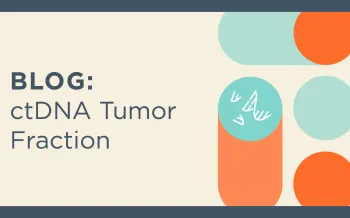
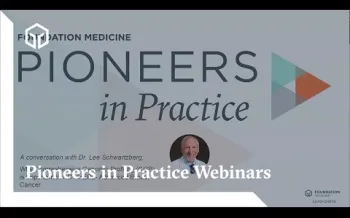
Why Comprehensive Genomic Profiling (CGP) is Important in HR+/HER2- Advanced Breast Cancer
In this brief webinar presented by Dr. Lee Schwartzberg, we review current guidelines pertaining to CGP and biomarker-driven therapies for patients with advanced breast cancer.
Healthcare Provider Education
Decoding the science of precision oncology by medical experts for medical professionals, the Knowledge Center is a uniquely informative resource dedicated to helping you identify actionable alterations and therapy options for your patients. Podcasts, articles, or publication summary videos—choose your path to explore the science underlying genomic testing.
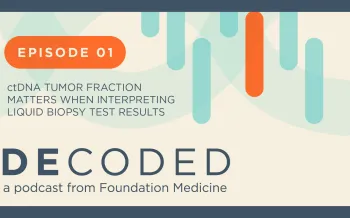
Decoded – Episode 1: ctDNA Tumor Fraction Matters When Interpreting Liquid Biopsy Test Results
Lincoln Pasquina, PhD, Director of Clinical Development at Foundation Medicine, explains how physicians can leverage Foundation Medicine’s ctDNA tumor fraction to improve clinical care. ctDNA tumor fraction is a measure of how much ctDNA is measured in an individual liquid biopsy.
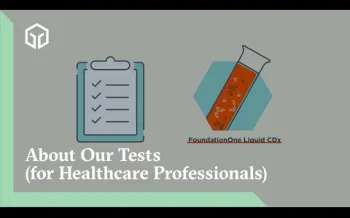
Measurement of ctDNA tumor fraction identifies informative negative liquid biopsy results and informs value of tissue confirmation
See the highlights of this peer-reviewed article from Clinical Cancer Research in a brief animated publication summary. Watch the video to learn how Foundation Medicine's ctDNA tumor fraction can distinguish whether tumor-derived DNA is present in a liquid biopsy sample. Using the ctDNA tumor fraction threshold of 1%+, providers can have increased confidence in negative results on a liquid biopsy.
Peer to Peer Education
Pioneers in Practice is an educational webinar series that reviews the importance of Comprehensive Genomic Profiling (CGP) for patients with Advanced Breast Cancer, Non-Small Cell Lung Cancer, and Prostate Cancer.
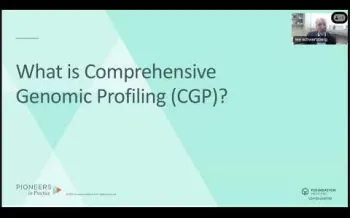
Why Comprehensive Genomic Profiling (CGP) is Important in Advanced NSCLC
In this brief webinar presented by Dr. Lee Schwartzberg, we review current guidelines pertaining to CGP and biomarker-driven therapies for patients with advanced non-small cell lung cancer (NSCLC).
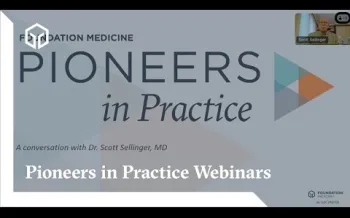
Why is CGP important? A Pioneers in Practice Webinar
In this educational webinar, Dr. Scott Sellinger discusses why comprehensive genomic profiling (CGP) is important in advanced prostate cancer. He reviews pertinent guidelines and FDA-approved biomarker driven therapies for patients with advanced prostate cancer and briefly discusses the differences between genetic and genomic testing for these patients.
Biopharma Education
Discover insights that drive innovation. Access educational resources designed to provide the latest advancements in therapy development, clinical trials, and comprehensive genomic profiling. Explore expert perspectives, in-depth guides, and actionable solutions to accelerate breakthroughs.
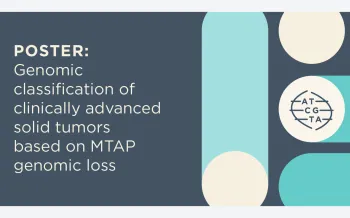
Genomic classification of clinically advanced solid tumors based on MTAP genomic loss
Presented at ASCO 2024
Key Findings:
- The genomic landscape of MTAP complete and partial loss across more than 540,000 clinical samples shows a frequency pan-cancer of 9.3%
- Highest frequencies in glioblastoma (43%), bladder cancer (25%), pancreatic cancer (22%), and non-small cell lung cancer (13%)
- MTAP loss is a frequent genomic alteration of emerging clinical importance as the clinical trials using PRMT5 and MTA-2 inhibitors progress
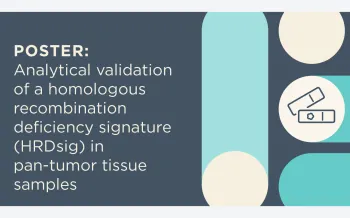
Analytical validation of a homologous recombination deficiency signature (HRDsig) in pan-tumor tissue samples
Presented at AMP 2024
Key Findings:
- HRDsig is a pan-tumor biomarker on FoundationOne®CDx tissue-based test that does not rely on gene alterations and instead uses a DNA scar-based approach to calculate a score based on copy number features to enable detection of both genomic and non-genomic mechanisms of HRD
- Analytical validation demonstrated high concordance compared to an independent HRD biomarker, low false-positive rate, and high reproducibility across disease areas
Additional Notes
FoundationOne®CDx and FoundationOne®Liquid CDx are qualitative next-generation sequencing based in vitro diagnostic tests for advanced cancer patients with solid tumors and are for prescription use only. FoundationOne CDx utilizes FFPE tissue and analyzes 324 genes as well as genomic signatures. FoundationOne Liquid CDx analyzes 324 genes utilizing circulating cell-free DNA and is FDA-approved to report short variants in 311 genes. The tests are companion diagnostics to identify patients who may benefit from treatment with specific therapies in accordance with the therapeutic product labeling. Additional genomic findings may be reported and are not prescriptive or conclusive for labeled use of any specific therapeutic product. Use of the tests does not guarantee a patient will be matched to a treatment. A negative result does not rule out the presence of an alteration. Some patients may require a biopsy for testing with FoundationOne CDx when archival tissue is not available which may pose a risk. When considering eligibility for ROZLYTREK® based on the detection of NTRK1/2/3 and ROS1 fusions, or for TEPMETKO® based on the detection of MET SNVs and indels that lead to MET exon 14 skipping, testing using plasma specimens is only appropriate for patients for whom tumor tissue is not available for testing. Patients who are tested with FoundationOne Liquid CDx and are negative for other companion diagnostic mutations should be reflexed to tumor tissue testing and mutation status confirmed using an FDA-approved tumor tissue test, if feasible. For the complete label, including companion diagnostic indications and important risk information, please visit www.F1CDxLabel.com and www.F1LCDxLabel.com.